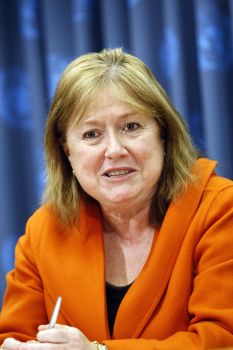By DION NISSENBAUM
WASHINGTON—The United Nations has expanded an internal examination into its largest global development program because of questions over the management of international aid funds in Afghanistan.The U.N. Development Program's Afghanistan office used a recently established fund to hand out millions of dollars in donated money to Afghan ministries without proper oversight of how it was spent, according to a preliminary report by U.N. auditors.
In a majority of cases they examined, the auditors found "no evidence" that Afghan ministries receiving funds through the UNDP's so-called Policy Advisory and Development program spent the funds for the intended purpose. There were indications that ministry workers received excessive pay raises or double salaries, according to the report, which was completed in July and viewed by The Wall Street Journal.
The preliminary summary didn't include detailed allegations about the program, which was established to support special projects at Afghan ministries. But the questions it raised were echoed in recent months by several past and present UNDP employees who have alleged in interviews that the program was used to spread cash to win favor inside Afghan ministries for U.N. initiatives.
The U.N. said the document reflected initial findings that were undergoing further examination. In some cases, it said in a statement, further investigation determined that some of the concerns about misallocated funds and high pay raises were unfounded.
The program was created in 2009 under the UNDP's then-director in Afghanistan, Manoj Basnyat, a long-time U.N. official from Nepal. Soon after arriving in Kabul, Mr. Basnyat and the UNDP established the fund, which handed out about $1 million a year to Afghan ministries.
The U.N. hasn't accused Mr. Basnyat of wrongdoing, and he hasn't addressed any allegations publicly. The U.N. declined to make him available for an interview and said it couldn't comment on personnel matters. The U.N. said it encouraged anyone with allegations of wrongdoing to contact it directly and said it maintains a "zero tolerance" anticorruption policy.
The Kabul office is working to phase out the Policy Advisory and Development program in the wake of the auditing questions, a senior U.N. official there said.
"It is not a slush fund," said the official. "My feeling is that it is a project that was weak in terms of the planning and reporting."
The UNDP has been at the center of a multibillion dollar effort to reform the Afghan government and rebuild the battle-damaged country. In part, it is supposed to serve as a model to Afghan politicians of efficiency and transparency.
But the UNDP became the focus of scrutiny this year amid allegations—by U.N. workers as well as by an international monitoring group—of corruption at a fund it oversees, the Law and Order Trust Fund for Afghanistan, a $1.4 billion pool financed by international donors to pay the salaries of the 150,000-member Afghan police.
This summer, the European Union blocked the release of $37 million in funds until the allegations are resolved. In June, the program removed five staff members, including the program's assistant director in Afghanistan. The U.N. didn't say why the workers were dismissed or put on administrative leave. The workers declined to comment or couldn't be reached.
U.N. investigators returned to Kabul over the weekend to continue their examination of the UNDP office in Afghanistan, U.N. officials said.
In April, Mr. Basnyat was replaced after more than three years as country director in Afghanistan by Alvaro Rodriguez, a longtime UNDP employee who had previously held the same position in Pakistan and Somalia. The switch took place under a routine U.N. assignment rotation and wasn't a result of the audit, according to U.N. officials. He is currently on assignment in New York, the U.N. said.
Last year, the UNDP presented Mr. Basnyat with its Julia V. Taft Award, given each year to its most outstanding country office.
—Nathan Hodge in Kabul Afghanistan, contributed to this article.


 Joe Torsella
Joe Torsella  undpwatch
undpwatch 

















































